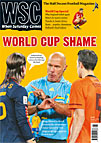 An anti-climatic exit, injured star player and end of an era – the next World Cup hosts need to improve. Robert Shaw explains
An anti-climatic exit, injured star player and end of an era – the next World Cup hosts need to improve. Robert Shaw explains
Brazilians don’t anticipate winning every World Cup. But they do at least expect to bask in their technical superiority until a defensive howler denies the assumed divine right to be world champions. Frustration at losing to Holland – opponents overcome in 1994 and 1998 – was compounded by the sense that the Dutch posed the biggest hurdle to Brazil’s fourth final appearance in five World Cups.
Despite their winning streak Holland looked eminently beatable – a feeling reinforced by the first half of the quarter-final. Brazil’s subsequent collapse was bewildering: rudimentary errors from a back line and keeper feted as one of the world’s best, the dismissal of Felipe Melo and the shambolic pursuit of an equaliser. It was at odds with domestic TV commercials that lauded the players as “warriors”.
Dunga’s media war was one of the self-inflicted wounds. After the win against Ivory Coast, a TV journalist Alex Escobar was the target of the coach’s wrath during a press conference. Dunga noticed Escobar shaking his head while talking on his mobile. Wrongly assuming that the conversation was about him, he asked if there was a problem. Escobar said there wasn’t but Dunga was seen to mutter oaths and continued swearing at the end of the press call. The Globo network attacked Dunga after losing privileged access to the players, something he promised to stop after it was said to have undermined the team in 2006. Most Brazilians backed Dunga in his battle with Globo – they just couldn’t stand his team’s style of play. The heavy criticism he suffered as a player in losing campaigns in 1990 and 1998 appeared to drive Dunga on but the attritional war with Globo took its toll, reducing the coach to the status of a gatekeeper, more concerned about blocking the media than developing tactics. Many felt that Dunga’s erratic touchline behaviour during games transmitted itself to the team although it was nothing new – he had been dismissed from the touchline in a friendly against Mexico in 2007.
Dunga subsequently suggested that the impact of his work in “restoring pride” could be seen by the funereal quiet of the dressing room after defeat. But this was widely mocked, with pundits noting that unity and commitment are not enough without the right playing talent. Melo came to symbolise the Dunga era, his presence interpreted by some as a way for the coach to continue his playing career vicariously. Critics saw a squad packed with hard-running midfielders but lacking the artfulness of a Ronaldinho to unlock crowded defences. The reliance on Kaká foundered on his lingering injury problems, with team doctor Jose Luiz Runco later admitting he was only 80 per cent fit. The suggestion that Júlio Baptista was a suitable stand-in prompted a stampede to check Kaká’s medical bulletins. Dunga’s emphasis on counter-attacking proved inflexible, with Brazil failing their first serious test. Critics argued it was a team hewn from the same material as the mostly dour 1994 World Cup winners, except that Luís Fabiano is no Romário. In Jornal do Brasil, Tostão acknowledged that the quarter-final exit was no surprise. “We should recognise the merits of our opponents more. We need to end this arrogance of believing that Brazil is always the best.”
Ricardo Teixeira, president of the Brazilian federation (CBF), declined to accept Dunga’s claim that he laid important foundation for 2014. The new manager, Teixeira said, would be starting from scratch; when Dunga and assistant Jorginho floated the possibility of staying on, their dismissal was announced on the CBF’s website. Questions might be asked about whether Brazilian World Cup success was secondary to Teixeira’s ambition to become president of FIFA. Friendlies against Zimbabwe and Tanzania could hardly be justified for footballing reasons, while he seemed more focused on socialising at FIFA events than dealing with onfield matters, despite the fact that Dunga was his personal appointment. Teixeira pledges that Brazil will focus on youth. But for O Globo columnist Fernando Calazans a new broom is not enough – the country needs to rediscover its footballing traditions: “The renewal of Brazilian football will only be effective when it becomes Brazilian again, or rather when it goes back to being different. Different from all the rest.”
Dunga was paid around 20 per cent of what his possible successor Luiz Felipe Scolari demands but many Brazilians will be tempted to suggest that you get what you pay for. They also hope that when the World Cup comes to Brazil in 2014, following their team will feel less like hard work.
From WSC 282 August 2010